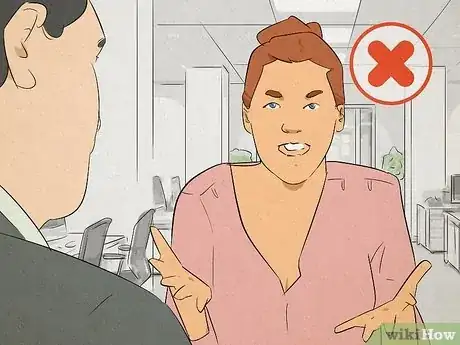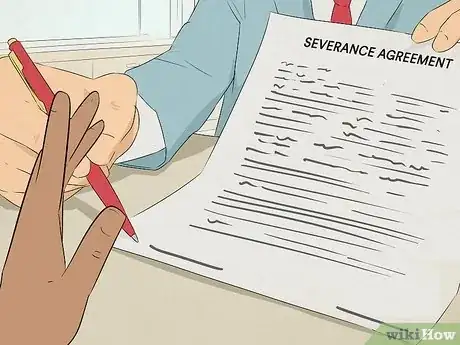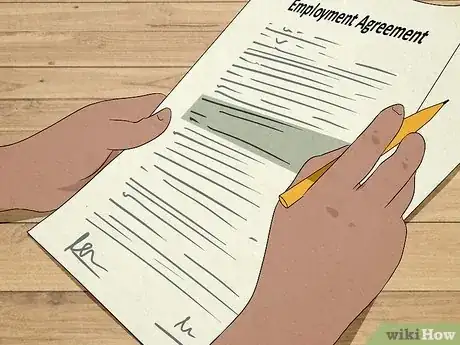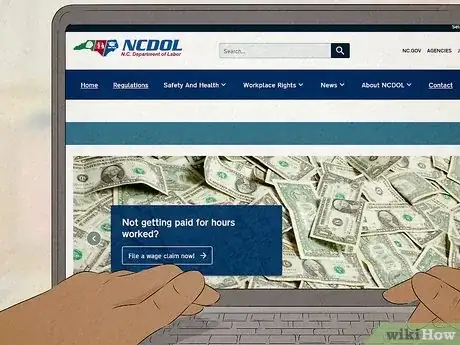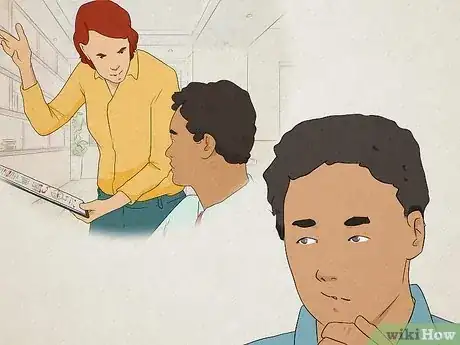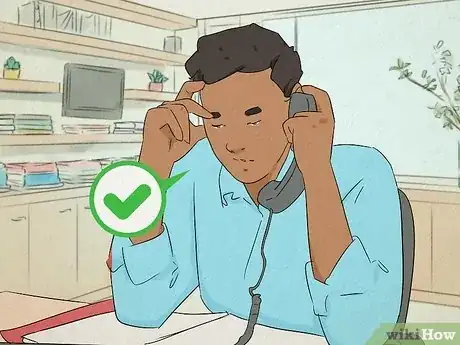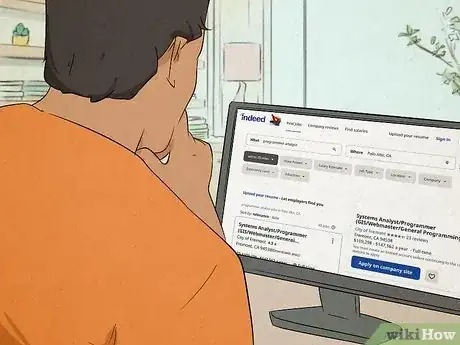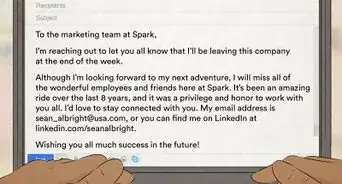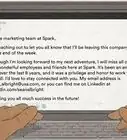This article was co-authored by Julia Yacoob, PhD. Dr. Julia Yacoob is a Licensed Clinical Psychologist practicing in New York City. She specializes in Cognitive Behavioral Therapy (CBT) for adults coping with a variety of symptoms and life stressors. Dr. Yacoob earned an MS and Ph.D. in Clinical Psychology from Rutgers University, and pursued specialized training at Weill Cornell Medical College, New York Presbyterian Hospital, Memorial Sloan-Kettering Cancer Center, the Institute for Behavior Therapy, and Bellevue Hospital Cancer Center. Dr. Yacoob is a member of the American Psychological Association, Women’s Mental Health Consortium, NYC Cognitive Behavioral Therapy Association, and Association for Cognitive and Behavioral Therapies.
There are 13 references cited in this article, which can be found at the bottom of the page.
This article has been viewed 156,060 times.
Being fired is a difficult experience. You may experience a whole range of emotions – fear, sadness, anger, shame. You may be left with many questions about why you were let go and what you should do next. If your employer cannot provide a reason for firing you, that uncertainty escalates. There are a number of steps you should take to solidify your situation.
Steps
Grasping the News of Termination
-
1Listen carefully to your employer. Sit quietly and listen to what your employer says. You need to retain the information that is given to you. Listen closely to what your boss says that you can have a better understanding of why you are being fired.[1]
-
2Refrain from arguing. The decision to terminate your employment has already been made. Nothing you can say, at this point, will change your employer’s decision. Do not argue or attempt to persuade your employer to reconsider.[2]
- If you do argue, your employer might be inclined to say negative things about you to other perspective employers.
Advertisement -
3Stay calm. When you are fired, you are probably going to feel emotional. This is completely understandable.[3] However, it’s best not to let your emotions get the best of you. Whether you feel sad or angry, take a deep breath, remain calm, and try not to cause a scene.[4]
- Practice breathing exercises if you feel like you're about to have an emotional outburst. Excuse yourself for a moment and then breathe in slowly while you count to 10. Hold your breath for a moment, and then slowly breathe out while counting to 10 again. Do this until you feel like you have a better grasp on your emotions.
-
4Ask questions. If your employer has not explained his or her reasons for terminating your employment, it is fine to ask.[5] Be prepared, however, to get an unsatisfying answer, such as “it was just a business decision,” or no answer at all. In addition, consider asking:
- What are the next steps?
- Is there paperwork to fill out?
- Does the company provide information for a staffing service?
- What are the exit procedures?
-
5Consider negotiating the reason for your dismissal. You can agree with your ex-boss to describe the dismissal in a neutral way so that when you apply for future jobs, you can smoothly pass reference checks.
-
6Postpone signing a severance agreement. If you are offered a severance package in exchange for signing a “general release,” think twice before signing immediately. Doing so would eliminate your opportunity to make legal claims against your employer because it effectively says that the company is released of all legal obligations when firing you.[6]
- Take your time, and consider showing the agreement to a lawyer before you sign.
-
7Try to leave on good terms. As upset as you may be, remember to thank your employer for the opportunity. Then be on your way. Allowing your anger and frustration to take over will only hurt you in the long run. If you behave unprofessionally – if you yell, throw things, or threaten anyone, for example – your actions will be noted, and they may be reported to potential employers.[7]
- It is important to leave on good terms so that you can potentially use your ex-employer in the future, such as if a job you apply for requires that you speak to your old employer before hiring you.
-
8Start planning. You should cut expenses and budget so that you have the funds to support yourself for several months without any new income. If you need to make to make any doctor’s visits, you should plan to do it before your insurance expires.[8]
Knowing Your Rights
-
1Understand the concept of “employment-at-will.” In the United States, most employees work “at will.” Employment-at-will means the employer has the right to terminate your employment with or without cause at any time, except illegally as with discrimination or retaliation. Unfortunately, employment-at-will means that your employer does not have to provide a clear reason for letting you go.
- If you are not sure whether your job was an employment-at-will, check your new hire paperwork (if you still have it), ask the Human Resources department, or contact your state’s Department of Labor.
-
2Recognize if you are not employed at will. If you signed a special contract with your employer, live in a state with additional regulations, or are part of a union contract, you might not be employed at will. In such situations, your employer could be forced to prove that you qualify for being fired. Also, you might be entitled to some sort of compensation.[9]
- Check your state’s Department of Labor website for information about any relevant local regulations.
- Check your new hire paperwork to see if the contract gives you any special rights.
- There are cases where a contract will actually make you liable to pay back compensation if you are fired. If you were paid for relocation expenses, you will typically be required to work for the company for a certain period of time or become liable to repay the benefits given you. Most contracts only stipulate this if you quit or were fired with good cause, but your employer can write the contract so as to make you liable in all situations.[10]
-
3Understand other types of wrongful termination. Even if you are employed at will, there are some cases in which an employer is not able to terminate you. Dismissal under these conditions can be cause for a lawsuit.
- You are not able to terminate an employee as retaliation. If you have filed a claim for workers compensation or reported legal transgressions by your employer, you have a case for wrongful termination.
- It is wrongful termination if there is any evidence that you have been fired because of discrimination against you on the basis of your race, national origin, gender, age, religion, pregnancy, family status, veteran status, disability, and, in some states, sexual orientation.
- Alabama, Alaska, Arizona, California, Delaware, Idaho, Massachusetts, Nevada, Montana, Utah, and Wyoming have laws that allow you to sue if you believe your employer did not have just cause. Unjust terminations include, firing an employee to prevent them from collecting sales commissions, misleading employees about prospects for promotion, and terminating someone to replace them with a person who is willing work for less.[11]
- If your company has a policy on termination in its employment manuals, this is part of your “implied contract” and any violation of it is a type of wrongful termination.[12]
-
4Know your rights when fired. Specifics may vary from state to state, so check with your state’s Department of Labor and ask your Human Resources representative or benefits administrator for more information .If you are fired, you may have the right to:
- Get unemployment benefits.
- Continue your health coverage with COBRA.
- Receive any compensation you have earned, including hours you have already worked. Half of all states require that your employer also pay you for unused vacation time. Even if your state does not, your employer could often be liable to a lawsuit if the refuse to cover your vacation time.[13]
Getting Unemployment Benefits
-
1Verify your eligibility. To see if you are eligible to claim unemployment, contact your state’s Unemployment Office and speak to a representative. Specific regulations can vary, but in general, to receive unemployment, you must be unemployed through no fault of your own – meaning that you were not let go due to a performance issue or any kind of misconduct. In addition, you must be able to work and actively looking for a job.
- If you quit, you are not eligible for unemployment unless you have “good cause.” Instances of “good causes” include: family emergencies, abusive or unsafe working conditions, leaving to care for a child, loss of transportation, or a drastic cut of pay – usually defined as 20% or more.[14]
- You are not eligible for unemployment if you have been fired with good cause.
- Self-employed individuals generally aren’t eligible for unemployment unless the business has been incorporated and pays into unemployment.[15]
-
2Prepare to file. You should research filing for unemployment for the state in which you were last employed, even if you have moved since then. You should be prepared to say if you have any holiday pay left. Also you should know whether you want taxes withheld from your unemployment check.[16]
-
3File a claim. Many procedures vary from state to state, but now all state unemployment programs have a website. Your state’s Unemployment Office should provide you with the correct information and procedures. Generally, when you file a claim, you should be prepared to provide the following information][17]
- Mailing address.
- Phone number.
- Social Security number.
- Driver’s license number.
- Mother’s maiden name.
- Name, address, and phone number of last employer.
- Full employment history for the preceding two years.
-
4Consider appealing if your claim is denied. Your employer might contest your claim to unemployment. If that happens, you will need to have an informal trial before the Unemployment Appeal Board. Review the state procedures for an appeal online.
- Make sure to act promptly. In many states, you must appeal within a certain time frame in order to secure a hearing. Check with your state’s Unemployment Office for details.
- You will need to attend all unemployment appeal board hearings or the case might be dismissed.[18]
- You should bring two copies of any written documents you might have, proving that you were fired without cause. Also, ask around to see if there are any witnesses that are willing to testify on your behalf.
- You can have a lawyer or other professional present your case for you, but the fees might be too large to merit such assistance.[19]
-
5Apply for COBRA. If you are eligible for unemployment, you should also be eligible for COBRA. This is a type of temporary insurance, the costs of which will be split between yourself and your former employer.
- Also look for insurance on healthcare.gov. In some cases, this will be cheaper than COBRA.
Preparing to Find a New Job
-
1Update your resume. Prepare a complete resume with all of your most recent job information before you apply for new jobs. Add any skills you developed at your last job, as well as any job experience.
- If you are at all unsure about the quality of your resume, do some research online or consider having a trusted friend look it over. It needs to be professional.
- To maximize the impact of your resume, consider adding important job duties, projects, and accomplishments to the “experience” section.
- You are not required to state in your resume how your employment ended. Do not indicate that you were fired unless directly asked by a prospective employer.[20]
-
2Begin looking for a new job immediately. Once you get over the initial shock of losing your job, get back out there. If it takes you a few weeks to get things in order, that’s okay; however, keep in mind that you may not land the first, second, or even third job for which you apply. The longer you are unemployed, the tougher it seems to get a new position – hiring managers take time between jobs into account.
-
3Prepare for interviews. If you get called for an interview, review your resume and the job description for the position. This will prepare you to answer tough questions about your experience and position yourself as the person they are looking for.
-
4Answer questions about your previous employment professionally. During an interview, you are likely to be asked why you left your least position. Be prepared to answer it honestly and professionally, in as positive a tone as possible. You do not need to provide a lengthy explanation; simply say that you were let go. Then, if you can do so honestly, follow up with “I left on good terms, and I am now looking for the right opportunity to utilize my strengths.”
- Put a positive spin on your experience. Say that while you were disappointed to be let go, you feel you are lucky to have learned so much and developed new skills.
- Do not talk negatively about your old boss. You never know what connections your old boss might have. It is also a good idea to show that you are a respectful employee.
- Be honest and do not make up a story about your dismissal. Employers check references and will catch a lie.[21]
Being Prepared in the Future
-
1Try to be prepared for the worst case scenario. It is important to keep in mind that no matter how secure your job may seem, there is always a chance that something will happen and you will have to leave your position. Because of this, it is important to be prepared, just in case.
- To be prepared, you should try to keep your resume as up to date as possible, and always have an eye on the job market in your field.
-
2Keep your CV or resume up to date. As you hone your skills and gain more work experience, it is important to update your CV (or resume) to reflect your changing and developing abilities. It can be difficult to keep track of all of the work that you do and the projects you work on, so try to write down details in your CV as soon as you have finished the task or feel your skills have developed. For example.
-
3Update your online profile. Along with your CV or resume, you should also keep your online profile(s) up to date. This means adding job experience and new skills as you develop them. Many companies look at online job profiles, like LinkedIn, when looking for new employees.
- Respond to ‘friend’ requests in a timely fashion to show that you are interested in networking and are organized.
-
4Look at classifieds and online job listings regularly. Try to stay up to date on the job market and any advancements that occur in your industry. Even if you feel like your job is secure, it is still a good idea to keep a running tab on other positions you feel you would do well in.
- Compare your own job to other positions to determine if you are being treated fairly. You might be surprised to find that people employed in positions similar to yours have higher or lower wages and benefits.
-
5Network when possible. Networking is an important practice when it comes to being prepared for the worst case scenario. The more connections you have, the more likely you will be to quickly find a job if you do happen to get fired. To network:
- Appear at parties and networking functions.
- Make connections online.
- Be respectful and charismatic with people you meet.
Expert Q&A
-
QuestionWhat should I do immediately after being fired?
 Julia Yacoob, PhDDr. Julia Yacoob is a Licensed Clinical Psychologist practicing in New York City. She specializes in Cognitive Behavioral Therapy (CBT) for adults coping with a variety of symptoms and life stressors. Dr. Yacoob earned an MS and Ph.D. in Clinical Psychology from Rutgers University, and pursued specialized training at Weill Cornell Medical College, New York Presbyterian Hospital, Memorial Sloan-Kettering Cancer Center, the Institute for Behavior Therapy, and Bellevue Hospital Cancer Center. Dr. Yacoob is a member of the American Psychological Association, Women’s Mental Health Consortium, NYC Cognitive Behavioral Therapy Association, and Association for Cognitive and Behavioral Therapies.
Julia Yacoob, PhDDr. Julia Yacoob is a Licensed Clinical Psychologist practicing in New York City. She specializes in Cognitive Behavioral Therapy (CBT) for adults coping with a variety of symptoms and life stressors. Dr. Yacoob earned an MS and Ph.D. in Clinical Psychology from Rutgers University, and pursued specialized training at Weill Cornell Medical College, New York Presbyterian Hospital, Memorial Sloan-Kettering Cancer Center, the Institute for Behavior Therapy, and Bellevue Hospital Cancer Center. Dr. Yacoob is a member of the American Psychological Association, Women’s Mental Health Consortium, NYC Cognitive Behavioral Therapy Association, and Association for Cognitive and Behavioral Therapies.
Clinical Psychologist Try to stay as calm as possible and ask some clarifying questions about the situation. If you're feeling nervous, try role-playing the conversation with a trusted member of your circle.
Try to stay as calm as possible and ask some clarifying questions about the situation. If you're feeling nervous, try role-playing the conversation with a trusted member of your circle. -
QuestionHow do you get over being fired?
 Julia Yacoob, PhDDr. Julia Yacoob is a Licensed Clinical Psychologist practicing in New York City. She specializes in Cognitive Behavioral Therapy (CBT) for adults coping with a variety of symptoms and life stressors. Dr. Yacoob earned an MS and Ph.D. in Clinical Psychology from Rutgers University, and pursued specialized training at Weill Cornell Medical College, New York Presbyterian Hospital, Memorial Sloan-Kettering Cancer Center, the Institute for Behavior Therapy, and Bellevue Hospital Cancer Center. Dr. Yacoob is a member of the American Psychological Association, Women’s Mental Health Consortium, NYC Cognitive Behavioral Therapy Association, and Association for Cognitive and Behavioral Therapies.
Julia Yacoob, PhDDr. Julia Yacoob is a Licensed Clinical Psychologist practicing in New York City. She specializes in Cognitive Behavioral Therapy (CBT) for adults coping with a variety of symptoms and life stressors. Dr. Yacoob earned an MS and Ph.D. in Clinical Psychology from Rutgers University, and pursued specialized training at Weill Cornell Medical College, New York Presbyterian Hospital, Memorial Sloan-Kettering Cancer Center, the Institute for Behavior Therapy, and Bellevue Hospital Cancer Center. Dr. Yacoob is a member of the American Psychological Association, Women’s Mental Health Consortium, NYC Cognitive Behavioral Therapy Association, and Association for Cognitive and Behavioral Therapies.
Clinical Psychologist Take it slow. Even though it feels discouraging and upsetting now, try to transform the situation into a learning experience.
Take it slow. Even though it feels discouraging and upsetting now, try to transform the situation into a learning experience. -
QuestionDoes my employer have to tell me why I was fired?
 Julia Yacoob, PhDDr. Julia Yacoob is a Licensed Clinical Psychologist practicing in New York City. She specializes in Cognitive Behavioral Therapy (CBT) for adults coping with a variety of symptoms and life stressors. Dr. Yacoob earned an MS and Ph.D. in Clinical Psychology from Rutgers University, and pursued specialized training at Weill Cornell Medical College, New York Presbyterian Hospital, Memorial Sloan-Kettering Cancer Center, the Institute for Behavior Therapy, and Bellevue Hospital Cancer Center. Dr. Yacoob is a member of the American Psychological Association, Women’s Mental Health Consortium, NYC Cognitive Behavioral Therapy Association, and Association for Cognitive and Behavioral Therapies.
Julia Yacoob, PhDDr. Julia Yacoob is a Licensed Clinical Psychologist practicing in New York City. She specializes in Cognitive Behavioral Therapy (CBT) for adults coping with a variety of symptoms and life stressors. Dr. Yacoob earned an MS and Ph.D. in Clinical Psychology from Rutgers University, and pursued specialized training at Weill Cornell Medical College, New York Presbyterian Hospital, Memorial Sloan-Kettering Cancer Center, the Institute for Behavior Therapy, and Bellevue Hospital Cancer Center. Dr. Yacoob is a member of the American Psychological Association, Women’s Mental Health Consortium, NYC Cognitive Behavioral Therapy Association, and Association for Cognitive and Behavioral Therapies.
Clinical Psychologist Usually, no. You can still ask questions and express your disappointment, though. If you think that it would be helpful, ask if you're able to give feedback about the way that things were experienced from your end, as this will surely help others in the same situation as you in the future.
Usually, no. You can still ask questions and express your disappointment, though. If you think that it would be helpful, ask if you're able to give feedback about the way that things were experienced from your end, as this will surely help others in the same situation as you in the future.
References
- ↑ Julia Yacoob, PhD. Clinical Psychologist. Expert Interview. 11 August 2021.
- ↑ http://money.usnews.com/money/blogs/outside-voices-careers/2012/06/25/10-things-you-should-do-immediately-after-being-fired
- ↑ Julia Yacoob, PhD. Clinical Psychologist. Expert Interview. 11 August 2021.
- ↑ http://money.usnews.com/money/blogs/outside-voices-careers/2012/06/25/10-things-you-should-do-immediately-after-being-fired
- ↑ Julia Yacoob, PhD. Clinical Psychologist. Expert Interview. 11 August 2021.
- ↑ http://money.usnews.com/money/blogs/outside-voices-careers/2012/06/25/10-things-you-should-do-immediately-after-being-fired
- ↑ Julia Yacoob, PhD. Clinical Psychologist. Expert Interview. 11 August 2021.
- ↑ http://money.usnews.com/money/blogs/outside-voices-careers/2012/06/25/10-things-you-should-do-immediately-after-being-fired
- ↑ http://jobsearch.about.com/od/firedtermination/fl/Can-You-Get-Fired-for-No-Reason.htm
- ↑ http://www.cbsnews.com/news/do-you-have-to-repay-relocation/
- ↑ http://www.nolo.com/legal-encyclopedia/wrongful-termination-was-firing-illegal-32282.html
- ↑ http://jobsearch.about.com/od/employmentlaw/a/employment-at-will-exceptions.htm
- ↑ http://hrdailyadvisor.blr.com/2014/11/06/must-accrued-vacation-time-be-paid-upon-termination/
- ↑ http://jobsearch.about.com/od/unemployment/fl/good-cause-unemployment.htm
- ↑ http://jobsearch.about.com/od/unemployment/a/unemployment-eligibility.htm
- ↑ http://jobsearch.about.com/od/unemployment/a/fileunemploy.htm
- ↑ http://jobsearch.about.com/od/unemployment/a/fileunemploy.htm
- ↑ http://jobsearch.about.com/od/unemployment/a/how-to-file-an-unemployment-appeal.htm
- ↑ http://jobsearch.about.com/od/unemployment/a/how-to-file-an-unemployment-appeal.htm
- ↑ http://jobsearch.about.com/od/salary/a/fired.htm
- ↑ http://jobsearch.about.com/od/salary/a/fired.htm


